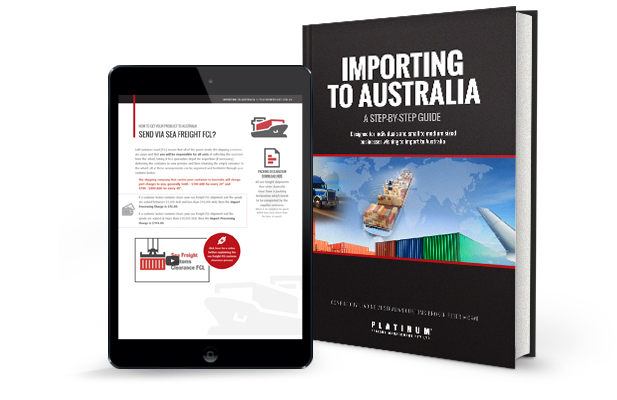Resources
INFOGRAPHICS
Below are some useful flowcharts that we have created to explain the often confusing customs clearance process.
Air Freight Customs Clearance explained
CUSTOMS CLEARANCE FORMS
To follow are forms that you may need as part of the customs clearance process.
Platinum® Standard Terms and Trading Conditions
Platinum® Authorisation and Acknowledgement of Trading Conditions

GET YOUR FREE IMPORTING TO AUSTRALIA EBOOK!
To help you understand the Australian import process we have compiled a handy ebook explaining Australian procedures and requirements. This must have guide to getting your goods to Australia covers all types of freight and includes links to required forms and videos to better explain the process.
PLATINUM FREIGHT® HAS 23 YEARS OF EXPERIENCE CUSTOMS CLEARING AIR CARGO
With extensive knowledge of the customs clearance process involved when cargo travels across borders, we aim to be the experts that you rely on for your air cargo shipments. Feel free to contact us today via our contact form.
EXPORTING TO AUSTRALIA: HOW DOES IT ALL WORK?
Customs Clearance FAQs
WHAT IS A CUSTOMS BROKER?
WHAT DOES A CUSTOMS BROKER DO?
A Customs Brokers role can be very diverse depending on the clients that they retain. A Customs Broker will develop knowledge and skills in performing clearances for clients who they specialise in.
A Customs Broker will receive the initial shipping documents from you then he / she will:
- Contact the airline / shipping line to request details of the cargos arrival date.
- Attend to the airline / shipping line to collect a ‘delivery order’ and pay any charges necessary to the airline / shipping line.
- Attend to Customs for any documentary checks necessary on a Customs clearance file.
- Attend to DAWR for any documentary checks necessary on a Customs clearance file.
- Attend to any inspections / examinations in relation to Australian Border Force [ABF], Department of Agriculture and Water Resources [DAWR], pillage or damage.
- Organise collection of cargo from the airline / wharf.
- Organise delivery to your premises.
- Forward to you a completed Customs Clearance folder which needs to be retained by ‘the owner of the goods’ for a minimum of years.
Do I need a customs broker?
WHAT ARE THE COSTS OF USING A CUSTOMS BROKER?
WHAT ARE THE DUTY AND GST RATES APPLICABLE FOR ITEMS ENTERING AUSTRALIA?
MY GOODS WILL BE IN THE COUNTRY FOR LESS THAN 12 MONTHS – ARE THERE ANY SAVINGS?
WHY DO I NEED A PACKING DECLARATION FOR MY SEA FREIGHT SHIPMENT?
I HAVE A SMALL AMOUNT TO IMPORT BY SEA FREIGHT… WHAT DO I NEED TO KNOW?
WHO CHARGES THE PORT CHARGES FOR SEA FREIGHT CARGO?
I HAVE A SMALL AMOUNT TO IMPORT BY SEA FREIGHT… WHAT DO I NEED TO KNOW?
I WANT TO IMPORT FOOD OR DRINK TO AUSTRALIA, HOW DO I FIND OUT THE REQUIREMENTS?
Food and drink is a technical area and it has many issues; firstly there is the Australian Border Force http://www.border.gov.au/australian-border-force-abf, DAWR http://www.agriculture.gov.au/import, Imported Foods and then finally the Australian Food Standards. We have many customers who import food and drink and we consult with them before they ship the goods to make sure that all areas of concern have been covered.
If you wish to export food or drink to Australia, the minimum requirements for the label on the package is that it must :
- be in English
- state your name or your business name
- state your address or your business address
- list the ingredients
- state the expiry date / batch number / lot code
- state the country of manufacture
